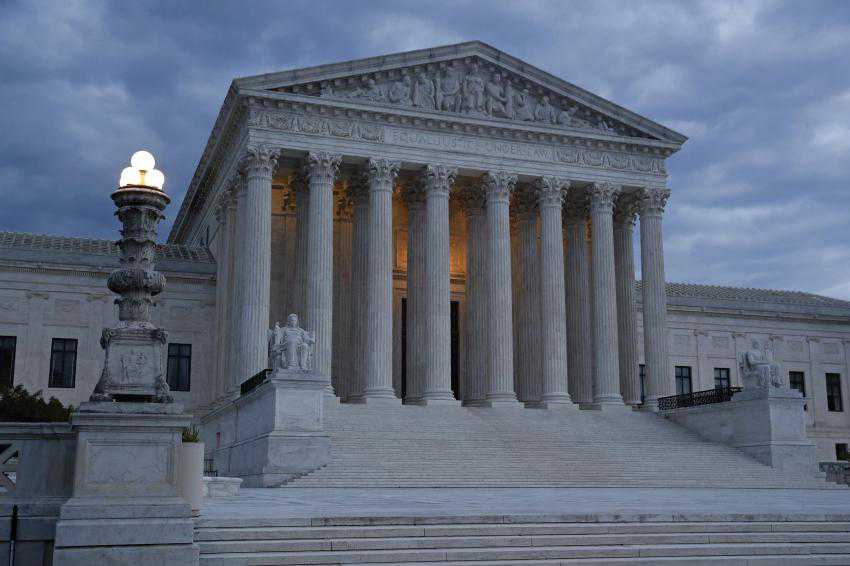Trump asking Supreme Courtroom to bar needs for taxes, bank records
11 May, 2020

President Donald Trump is hoping to persuade a good Supreme Court with several of his appointees to hold his tax and other financial records from getting turned to lawmakers and a fresh York district attorney.
The justices are hearing arguments by telephone Tuesday in a pivotal legal fight that could affect the presidential campaign, despite having the coronavirus outbreak and the resulting economic fallout. Rulings against the president could lead to the quick release of personal financial data that Trump provides sought strenuously to keep private.
The justices have already been hearing cases by phone this month in an effort to help slow the spread of the novel coronavirus. Six of the nine Supreme Court justices are older than 65.
Trump has resisted calls to release his tax returns since before his election found in 2016. Now, joined by the Justice Department, he's appealing lower courtroom rulings that motivated subpoenas released by the home of Representatives and the Manhattan district legal professional to his longtime accounting company and two banks for a long time of taxation statements, bank records and different financial records are valid.
The president is advancing broad arguments to try to stymie Residence Democrats. In the event relating to the criminal investigation introduced by District Attorney Cyrus R. Vance Jr., Trump is asserting that even while he holds business office he cannot possibly be investigated.
His Supreme Courtroom arguments draw on rules review articles that will be very familiar to 1 person in the court. “By the end of your day, ‘a President who's concerned about a continuing criminal investigation is almost inevitably going to do a worse task as President,'" Trump's attorneys told the court, quoting from a 2009 article by now-Justice Brett Kavanaugh.
The Trump-appointed Kavanaugh previously worked on independent counsel Ken Starr's investigation of President Bill Clinton, which led to Clinton's impeachment in 1998. He was acquitted by the Senate the next year.
Kavanaugh is quoted five circumstances in Trump's primary Supreme Court brief in the Vance case. Justice Neil Gorsuch is definitely Trump's other high-courtroom appointee.
Trump has up to now lost at every stage, but the records have not been turned above pending your final court ruling.
The case about congressional subpoenas has significant implications regarding a president’s capacity to refuse a formal request from Congress. In another fight at the federal government appeals court in Washington, D.C., over a congressional demand for the testimony of ex - White House counsel Don McGahn, the administration is certainly making equally wide arguments that the president's close advisers happen to be “absolutely immune" from having to appear.
THE HOME argues that Congress has very broad subpoena powers and that courts ought to be reluctant to hinder them. “Many momentous separation-of-powers disputes have come before this Courtroom," the House wrote in its major Supreme Courtroom brief. “This dispute ... is not one of these."
In two previous cases over presidential power, the justices acted unanimously in requiring President Richard Nixon to carefully turn over White House tapes to the Watergate specialized prosecutor and in allowing a sexual harassment lawsuit against Clinton to move forward.
In those cases, three Nixon appointees and two Clinton appointees, respectively, voted against the president who chose them for the high court. A fourth Nixon appointee, William Rehnquist, sat out the tapes circumstance because he had worked carefully as a Justice Section official with some of the Watergate conspirators whose approaching trial spurred the subpoena for the Oval Office recordings.
The subpoenas aren't fond of Trump himself. Instead, House committees want records from Deutsche Bank and Capital One, and also the Mazars USA accounting company. Mazars also is the recipient of Vance’s subpoena.
Appellate courts on Washington, D.C., and NY brushed aside the president's arguments in decisions that centered on the fact that the subpoenas had been addressed to third functions asking for records of Trump’s organization and financial dealings simply because a private citizen, much less president.
Two congressional committees subpoenaed the lender documents as portion their investigations into Trump and his businesses. Deutsche Lender has been one for the few banks ready to lend to Trump after some corporate bankruptcies and defaults starting in the first 1990s.
Vance and the home Oversight and Reform Committee sought records from Mazars concerning Trump and his businesses based on obligations that Trump’s ex - personal attorney, Michael Cohen, arranged to hold two females from airing their claims of affairs with Trump through the 2016 presidential race.
Source: japantoday.com
TAG(s):
